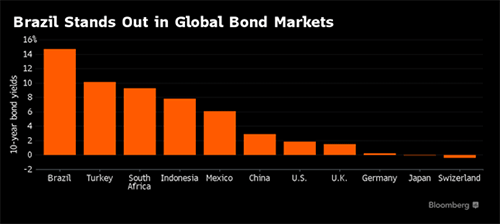Investors submitted $30 billion worth of bids for just $9 billion of Berkshire bonds on offer this week. They can’t get enough of the stuff! The company will use the proceeds to pay back a $10 billion loan it used as part of a package to buy industrial goods company Precision Castparts last year for $32 billion.
The offering was made up of 2-year, 3-year, 5-year, 7-year and 10-year bonds. But because Berkshire is considered such a good credit risk – and everyone considers Buffett and his partner Charlie Munger geniuses – demand for the Berkshire bonds is off the charts.
And it’s not just Berkshire. Over $264 billion worth of investment-grade corporate debt has been snaffled up in the last 12 months. Much of that came from InBev’s $46 billion bond offering, and from $12 billion offerings by Apple and ExxonMobil respectively. High quality corporate debt is in demand.
It’s probably not just for the yield. Investors are happy to turn their money over to established, cash-generating enterprises than to, say, the government of Greece. But what about Brazil, where government bonds yield investors a juicy 14%?
A 14% yield on government bonds looks downright luscious when you remember that there’s over $7 trillion in global sovereign debt with a negative yield. But Brazil has not been kind to investors. Brazilian debt, in local currency terms, is down 34% in the last three years. And no country has been hit harder by the crash in iron ore prices and the slowdown in China’s manufacturing machine.
But the good news is that Brazil is trying to crack down on corruption and throw its dodgy politicians in jail. Former President Lula da Silva was taken into custody last week for questioning. Incumbent President Dilma Rousseff faces an increasing chance of impeachment for corruption related to state-owned oil company Petrobras. Buy when the politicians are on their way to jail?
Think about it in Charlie Morris’s terms. If a momentum crash is losers winning, Brazil is due to win. It won’t fall as much because it’s already fallen so much, goes the theory.
Category: Economics


